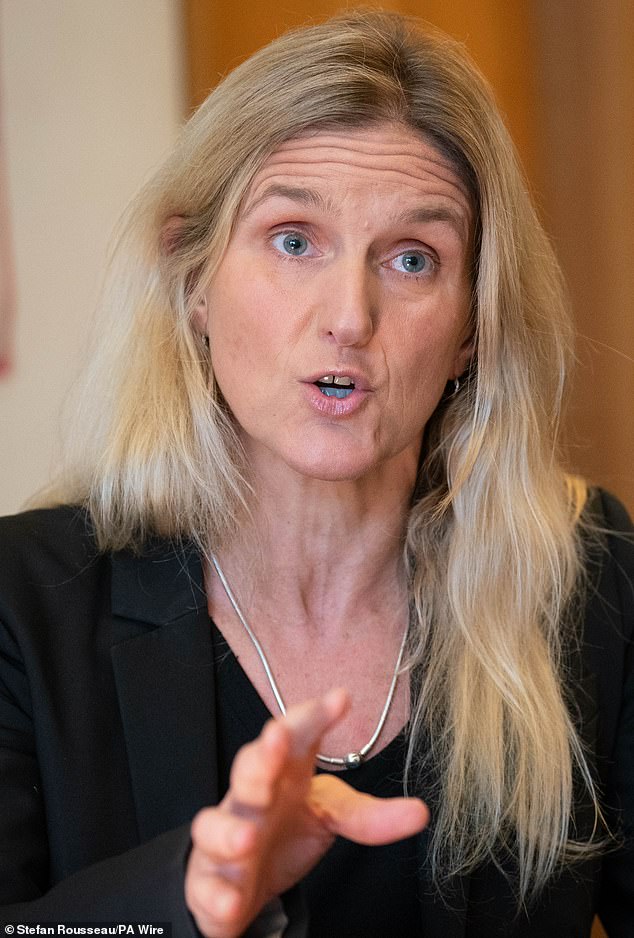Assisted dying bill could see terminally-ill patients have to swallow toxic 'sludge' of 100 pills in their last moments, doctors warn
Terminally-ill adults seeking to end their lives under a proposed new law could spend their final moments forcing down a poisonous mixture of drugs, doctors have warned.
If a bill put forward by the Labour MP Kim Leadbeater comes to fruition, it would become legal for people over the age of 18 and expected to die within six months to receive life-ending assistance.
But the proposed legislation, intended to give individuals the right to choose a peaceful and dignified demise, offers no guarantee of a ‘Hollywood death’ according to medical professionals who have reviewed Leadbeater’s plans.
Under the terms of the draft legislation, an ‘approved substance’ would be prepared by a doctor and then either ingested by patients or self-administered using a ‘medical device’.
In practice, say palliative care experts, that will boil down to a choice between swallowing a crushed ‘sludge’ of as many as 100 pills or applying a lethal injection.
Baroness Ilora Finlay, a professor of palliative medicine and cross-bench peer, warned that the first of those routes would involve creating a ‘sort of sludge which tastes absolutely foul and makes you feel sick’.
Professor Mark Taubert, a consultant in palliative medicine at Velindre University NHS trust and Cardiff University School of Medicine, has also warned against the ‘picture-book notion of a death with the standard drugs used for assisted deaths in countries that legalise it’.
Writing on social media last month, Taubert said the ‘clinical reality’ was one of ‘sedatives, anti-sickness medications and a crush of about 80 tablets, often mixed with sweet syrup to mask its taste’.

Kim Leadbeater, the Labour MP behind the Terminally Ill Adults (End of Life) Bill, which will be debated by Parliament later this month

Campaigners demonstrate outside the Houses of Parliament ahead of the initial debate and vote, which will be held on 29 November
Both Lady Finlay and Taubert have cited an op-ed published in the LA Times in 2016 in which Linda Van Zandt described helping her aunt to die following a struggle with amyotrophic lateral sclerosis, a fatal motor neuron disease.
Van Zandt detailed how, helped by her husband and sister, she fed her aunt a lethal cocktail of drugs prescribed by a doctor under a newly introduced assisted dying law, scraping powder from 100 capsules into a ‘super-sweet syrup’ while administering anti-nausea and anti-nausea pills.
‘When we sat back down at the kitchen table, white powder everywhere, we all had to wonder, “Who the hell wrote this law?”’ wrote Van Zandt.
‘We had been forced to assist in the most bizarre fashion, jumping through seemingly random legal hoops and meeting arbitrary deadlines while my aunt suffered, and finally emptying capsules, making an elixir so vile I cried when I knew she had to drink it. This was death with dignity?’
The medical devices advocated by Leadbeater would apparently include syringe pumps, which provide a steady flow of medicine through a small tube or needle inserted into a patient’s skin.
Lady Finlay warned that, by combining anaesthesia with paralysis-inducing medication, such a method risked causing death by asphyxiation, with the body’s natural inclination to fight potentially causing the patient to recover consciousness.
Dr Matthew Doré, honorary secretary of the Association for Palliative Medicine, told the Telegraph: ‘Not only is it misleading to describe the Bill as anything but euthanasia if medications are being administered in this way (intravenously or subcutaneously) with a simple acknowledged go-ahead, but it destroys patients’ and families’ faith in how palliative care controls symptoms with syringe drivers currently.
‘It becomes terrifying for patients and family when palliative care suggests a syringe driver, as it will be seen as an end to their lives and as such, they may refuse adequate analgesia and symptom control, causing harm.’
An initial vote on the legislation, which specifies that two doctors and a High Court judge would have to verify patients were eligible and had made their decision voluntarily, will be held on 29 November.
However, further debates and votes would be required for the bill to be passed into law.



































































































































































































































